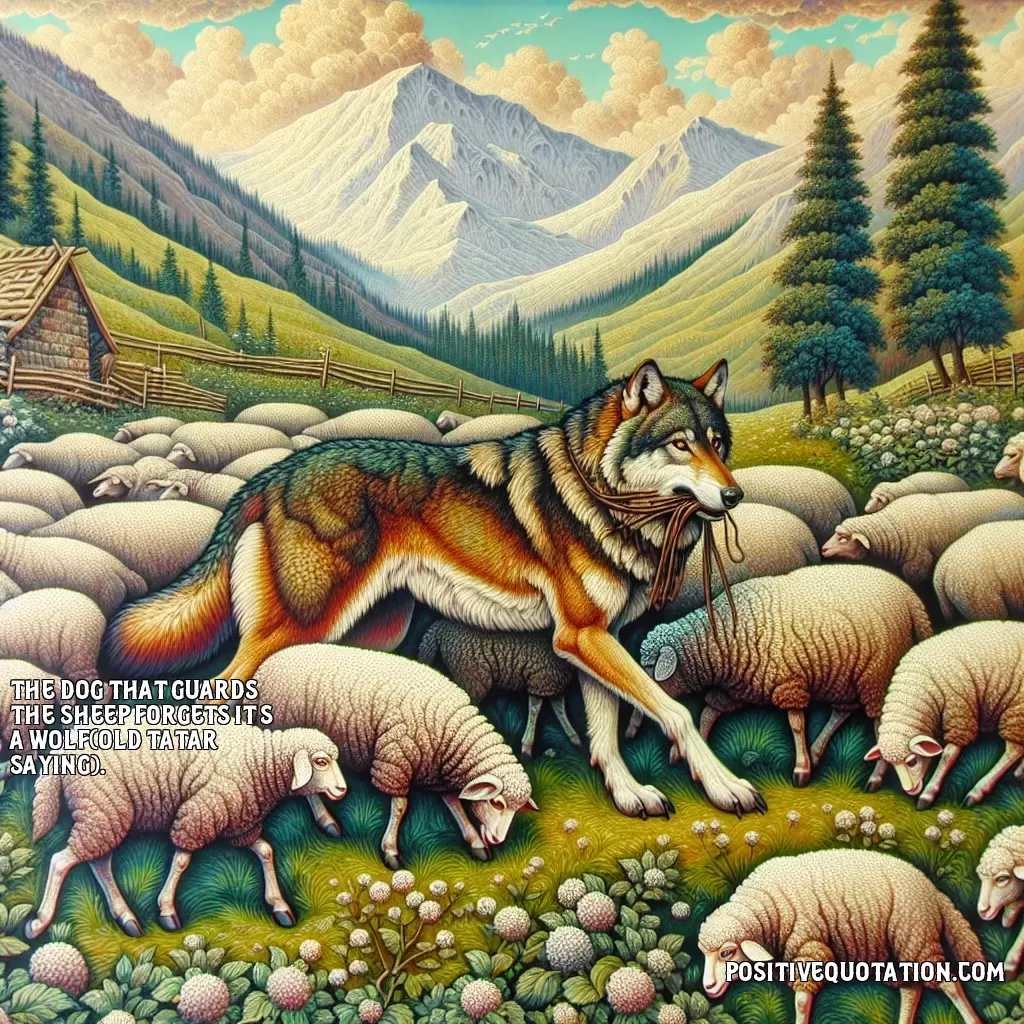
The dog that guards the sheep forgets it’s a wolf(Old Tatar Saying).
Author: Old Tatar Saying
👁️ 5 views

The dog that guards the sheep forgets it’s a wolf(Old Tatar Saying).
👁️ 5 views
The Old Tatar saying, "The dog that guards the sheep forgets it’s a wolf," offers a profound commentary on identity, roles, and transformation. This metaphor speaks to the idea of an individual undergoing a change in identity or behavior due to circumstances, responsibilities, or environment. At a surface level, the saying portrays a dog tasked with guarding sheep, an act that contrasts starkly with its inherent nature if we consider it to be a wolf, an archetypal predator. Here, the 'wolf' symbolizes one's primal instincts or original identity, often associated with wildness, independence, or aggression. On the other hand, the role of 'guarding sheep' implies protection, loyalty, and a duty-bound existence. Delving deeper, this aphorism suggests that when someone assumes a role or responsibility that is contrary to their inherent nature, they may undergo a transformative process. In this state, the individual (or the dog, in the metaphor) becomes so engrossed in their new role that they forget or subdue their original instincts or identity. It speaks to the power of adaptation and the human ability to redefine oneself, often driven by necessity, cultural expectations, or personal growth. Moreover, this transition can highlight the theme of domestication, where wild instincts are suppressed in favor of societal roles or expectations. It resonates with scenarios where people, when faced with certain duties or aspirations, can undergo significant personality shifts, embodying traits and behaviors aligned with their new roles rather than their innate characteristics. Thus, the saying emphasizes that identities can be fluid, and the responsibilities one chooses or inherits can profoundly reshape an individual's essence, illustrating the complex relationship between who we are and what we do.
Quote By: Old Tatar Saying
**Old Tatar Saying: A Window into Tatar Culture**
The Old Tatar Saying is a profound expression of the rich heritage and wisdom of the Tatar people, a Finno-Ugric group primarily found in present-day Tatarstan, Russia. This saying encapsulates the values, traditions, and collective experiences of the Tatar community, showcasing their resilience and deep-rooted connection to oral history. Tatar sayings, often passed down through generations, serve not only as a medium of communication but also as vessels of culture, righteousness, and moral guidance.
One of the most intriguing aspects of the Old Tatar Saying is its reliance on metaphors and imagery that reflect the agrarian lifestyle of the Tatars. These sayings often draw inspiration from nature, daily life, and the spiritual beliefs of the people. For example, a common Tatar saying might invoke the beauty of a river or the strength of a mountain, linking human experience with the natural world. This connection highlights the Tatar worldview, emphasizing harmony with nature and the importance of community.
Old Tatar Sayings are also known for their insights into human relationships and societal values. They often provide advice on virtues such as honesty, hard work, and respect for elders, which are cornerstones of Tatar culture. These sayings have the power to resonate universally, making them relevant beyond the Tatar community. The wisdom encapsulated in these phrases encourages reflection and introspection, serving as a guide in everyday life.
As a testament to the enduring legacy of oral tradition, the Old Tatar Saying reflects the historical struggles and triumphs of the Tatar people, maintaining its significance in contemporary society. Ethnomusicologists and cultural historians often study these sayings to gain a deeper understanding of Tatar identity and social dynamics. Renowned Tatar scholars, such as Gabdulla Tuqay, have emphasized the importance of preserving these sayings as a vital aspect of Tatar literature and language.
In summary, the Old Tatar Saying serves as a rich tapestry woven from the threads of history, culture, and the human experience. It stands as a powerful reminder of the wisdom of past generations and the continuity of Tatar identity in a changing world. By embracing and sharing these sayings, the Tatar people honor their ancestors and contribute to the broader cultural landscape, ensuring that their legacy endures for future generations.